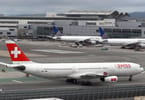MSC Cruises chief executive Pierfrancesco Vago has conceded the need for an industry-wide debate on the deployment of firearms aboard cruiseships following Saturday’s abortive pirate attack on the MSC Melody.
The 35,000 gt vessel, with 991 passengers and 536 crew on board, was attacked by pirates 180 miles north of the Seychelles on Saturday as it was heading for the Gulf of Aden.
The vessel’s crew and security guards drove the pirates off using fire hoses and, controversially, live rounds from pistols carried on board.
Mr Vago insisted that the company only carried arms onboard under exceptional circumstances, attributing the storage of “just a few pistols” aboard the MSC Melody to the recent escalation of pirate attacks off the horn of Africa.
He also claimed that, contrary to some press reports, security guards aboard the vessel had no independent access to the weapons. The pistols were kept in a safe on the bridge and released only at the discretion of the master.
At the same time, he admitted that the controversial issue of deploying firearms on passenger ships, which some believe will only lead to an escalation of pirate violence, must be debated.
He would not be drawn on the merits or otherwise of company policy on the issue. “It is too soon after the event for me to comment now, though certainly I can’t think of what it would have been like to have 1,000 hostages taken. It would have been a disaster.
“But we need to sit down and discuss this internally, and we need to discuss it as an industry.”
He described next month’s European Cruise Council meeting in Rome as the perfect venue for such talks.
In the meantime, Mr Vago said MSC would pull its vessels out of east African waters immediately. From now on, he said, the company will access South Africa via the Mediterranean and west Africa, calling in Morocco, Senegal and Namibia on its way to Cape Town and Durban.
Mr Vago also insisted that the company had not taken needless risks with its passengers.
“We would never take such risks,” he said. “We are selling holidays, not adventures.”
He said the company had recently changed its two itineraries to South Africa precisely because of the escalation of piracy in the region, and after consultations with the Maritime Security Centre for the Horn of Africa, run by Eunavfor, and the International Maritime Organization.
The new route took the MSC Melody considerably further from the coast of Somalia, adding 400 miles to the trip and forcing the ship to drop the Egyptian port of Safaga. In recompense, MSC added an overnight call at Port Victoria in the Seychelles. The MSC Rhapsody followed a similar course in March without incident.
Mr Vago also praised the professionalism of the MSC Melody’s master and crew in averting disaster, and the performance of its onboard security guards. MSC Cruises has a long-standing contract with an Israeli security firm.
He said the pirates announced their presence at around 1945 hrs GMT by aiming automatic weapons fire at the ship. The master immediately ordered the guests to their cabins, instructing them to turn out the lights.
The master also ordered the high-pressure fire hoses to be trained on the aft side, the only feasible area of access to the MSC Melody as it headed north in heavy seas. After the bridge came under fire, he handed out pistols to the security guards, Mr Vago said.
He then manoeuvred the vessel back and forth in order to enhance the impact of the waves, while the crew used the fire hoses and the security guards fired several shots into the air.
“[The pirates] were wet, in huge waves, amidst all this commotion, and then they realised we were armed,” Mr Vago said. “I think they were shocked at that.”
As the assailants departed, the MSC Melody headed east with its lights out.
Separately, wire service AFP quoted Mohamed Muse, reportedly the head of the pirate group, as lamenting their failure to take the vessel due to “technical reasons.”
“The capture of such a large vessel would have represented a major step forward for pirates off the Somalian coast, but unfortunately their tactics were good and we could not board.
“It was not the first time we have attacked this kind of boat and we were very close to capturing it,” Mr Muse told AFP. “We really showered it with bullets.”
WHAT TO TAKE AWAY FROM THIS ARTICLE:
- He said the company had recently changed its two itineraries to South Africa precisely because of the escalation of piracy in the region, and after consultations with the Maritime Security Centre for the Horn of Africa, run by Eunavfor, and the International Maritime Organization.
- He then manoeuvred the vessel back and forth in order to enhance the impact of the waves, while the crew used the fire hoses and the security guards fired several shots into the air.
- The master also ordered the high-pressure fire hoses to be trained on the aft side, the only feasible area of access to the MSC Melody as it headed north in heavy seas.






















